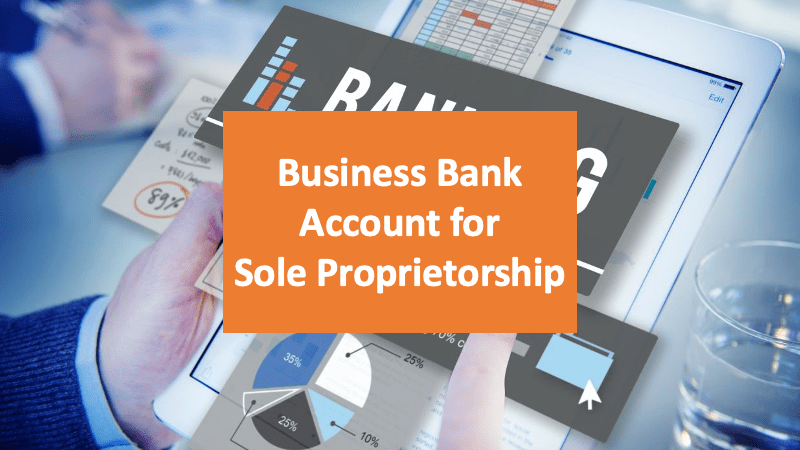Business Bank Account for Sole Proprietorship
Table of Contents
This article explains each type of business bank account for sole proprietorships and how to evaluate one for your small business.

When you’re a sole proprietor you’re by definition a single-person small business owner. Therefore, you might be thinking that you don’t need a business bank account for sole proprietorship. However, you do.
You need a business bank account if you’re serious about your business. We’re certain you’re serious about your business. A business bank account for a proprietor allows you to keep personal and business finances separate. This provides liability protection and makes it easy to do your taxes come tax time.
In the article, we explain the different business bank accounts for sole proprietors. This includes the different types of business bank accounts for sole proprietorships that you should evaluate. In addition, the features and fees of the different services that come with business banks account for sole proprietorships. The goal is to provide you with all the information you need in a simple and organized way. Therefore, when you go to choose a business bank account for your sole proprietorship you know exactly what to look for to meet your small business’s needs.
What are the different types of business bank accounts for sole proprietorships?
Just like with personal banking, there are a variety of different bank account types for sole proprietors. In addition, each bank account type comes with its own set of features.
The most common business bank account types for sole proprietors are:
Business checking account
Similar to a personal checking account. A business checking account is for day-to-day purchases, deposits, cash withdrawals, etc.
Business savings account
Similar to a personal savings account. A business savings account is where you can save money for future business use.
Merchant account
A merchant account is needed if you want to accept credit card or e-commerce payments.
Money market account
A money market account is a type of depository account that pays interest based on the current interest rates in the money markets. This is good if you’re looking for a higher return on your money while still having access to that money.
Related: A Complete Guide on Traditional Business Checking Accounts vs Money Market Accounts.
Certificate of deposit account
A certificate of deposit is a type of savings account that holds your money for a longer period of time but at a higher interest rate. CDs are typically for 6 months, 1 year, 5 years, or more. So while you don’t have access to the money, you make more money. This is good for businesses that have extra cash.
Trust account
Professionals such as lawyers are required to hold unearned income such as retainers in trust accounts.
For the rest of this article, we will focus primarily on business checking accounts, business savings accounts and merchant accounts for sole proprietors as this is where most of you are probably interested in focusing as well.
Related: Benefits of Having a Business Bank Account
Business Checking Account
Business checking accounts are for managing your everyday business financial needs. This includes debit card purchases, cash withdrawals, cash deposits, checks, etc. You want to choose an account that supports the nature of your business activities. In addition, business checking accounts are typically FDIC insured, and you want FDIC insurance on your deposits. For example, a business that relies heavily on cash will want a bank account that offers high cash deposit limits.
Account Features
Different banks offer different business checking account features. Some of the features you want to consider at are:
- Branch locations (if any)
- ATM networks
- Online banking
- Traditional bank
- Merchant Account
- Accounting software integrations
- Invoicing
- Payment app integration
- Business lending
Online bank vs Traditional bank (business bank account for sole proprietorship)
An online bank is a bank that doesn’t have physical locations, but instead only an online presence. Therefore you would do everything online from opening your account to making deposits. Many new online banks have been created recently to address the specific needs of small businesses.
A traditional bank is a bank that goes back to the history of the economy. These banks tend to have big well-known brand names. Most traditional banks have physical brick-and-mortar locations along with an ATM network.
Terms are Fees
Banking institutions charge different fees or no fees for a variety of services. In addition, there might be minimum deposits at some and not others. Here are some things to look out for in regard to terms and fees when looking for a business bank account for your sole proprietorship:
- Monthly fees
- Transaction fees
- Account activity fees
- Minimum balances
- Number of transactions limit
- Wire transfers
- Cash processing
- ATM fees
Bank Network
Traditional banks typically have brick-and-mortar locations and online banking. However, there are some banks, especially the newer ones that only offer online services and online banking. In addition, some online banks provide in-network ATMs or third-party ATMs. Businesses that work with a lot of cash would benefit from a traditional bank. Traditional banks tend to have higher deposit limits than digital banks.
Business Savings Account
A business savings account is similar to a personal savings account. In a business, savings account for sole proprietors you can keep extra money your business has. A business savings account is great for keeping money that you don’t need immediate access to because they tend to earn a good interest rate.
Business savings accounts work well when paired with a business checking account. Also, moving money between your business savings account and your business checking account is easy if you use the same banking institution for your business savings account and your business checking account.
When evaluating a business savings account take into consideration each of the following items.
Account features
Different banks offer different business savings account features. The best business savings accounts offer high annual percentage yields. Some of the features to look out for are:
- APY (Annual Percentage Yield)
- Financial management tools
Terms and fees
You might have to pay monthly fees for your business savings account depending on the bank you choose. In addition, you might be required to maintain a minimum balance. Fees and minimum balances can vary from bank to bank so make sure to do your research.
- Monthly fees
- Minimum balances
Bank network
Digital banks don’t have physical locations and therefore can’t accept cash deposits. With that said, a transitional bank with physical locations is better if your business needs in-person access to your business savings account.
What do I need for a business bank account?
Even as a single-person-owned business such as a sole proprietorship it is important to have a business bank account. A business bank account makes you look more professional, credible, and much more.
Why it’s important to keep business and personal finances separate
Even if you are a sole proprietor that works from home or has any other type of small single-person business it is important to separate your business and personal finances. A business bank account for a sole proprietorship is the first step in separating your business and personal finances.
The separation of your business and personal finances as a sole proprietor provides you with many benefits such as liability protection and it makes it much easier for your business taxes come tax time.
Related: Personal vs Business Checking Account: The Ultimate Guide
How to choose a business bank account
When you are choosing a business bank account look for features that are important and valuable to your business. For example, if your business takes a lot of payments, a payment processing software integration might be very important.
In addition, with so many business banking options available today you should decide whether you want a bank with physical locations or a digital bank. Also, if your bank is cash-heavy, then choosing a bank with a large ATM network and large cash deposit limits might be best for your business.
What is required to open a business bank account?
Any sole proprietor can open a business bank account. There are no special requirements, such as needing a legal business entity or a to be incorporated.
Related: Sole Proprietorship vs Single-Member LLC: Should I form a legal business entity?
However, there are a few required pieces of information that you need when opening a business bank account. These are:
- Personal identification documents, such as a driver’s license or state ID
- Social Security Number (SSN)
- Doing Business As (DBA) certificate (if you have one)
- Employer Identification Number (EIN), which is a business tax identification number
- Business license, sometimes required depending on your industry
Related: How to Open a Small Business Bank Account
Why should I open a sole proprietorship bank account?
Every small business owner, including a sole proprietorship, should have a business bank account that is separate from a person’s bank account. This not only makes it easier come tax time but it ensures your accounting is more accurate and makes your business look more professional.
Conclusion
In conclusion, we feel it is important for every small business owner, including a self-employed sole proprietor that works from home, to have a business bank account.
With that said, there are many different business bank account types to choose from. In this article, we have covered each of those business bank account types. Depending on your business and business needs one bank account type or even banking service provider might be better for your unique business needs than another.
Our intention in providing this overview of each different bank account type and its features is to help equip you with all the information you need to make the best decision for your small business.
In addition, we pay special attention to business checking accounts and business savings accounts. This is because these are the two most common business bank account types used by small businesses. We go over each detail to comfier for each bank account type to help you make the best choice.
We hope you enjoyed reading this article. As a community of sole proprietors and small business owners, we would love to hear about your experience in choosing a business bank account for sole proprietorship. Please share your experience in the comments below or email them to us at support@falconexpenses.com.
Was this article helpful?
We are a team of writers and contributors with a passion for creating valuable content for small business owners, self-employed, entrepreneurs, and more.
Feel free to reach out to use as support@falconexpenses.com




